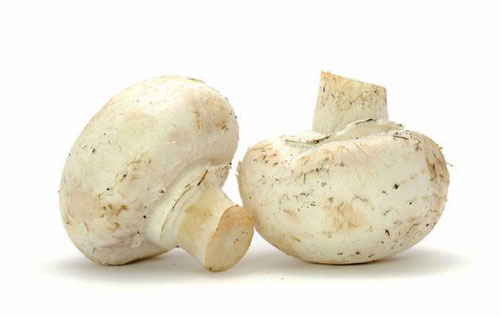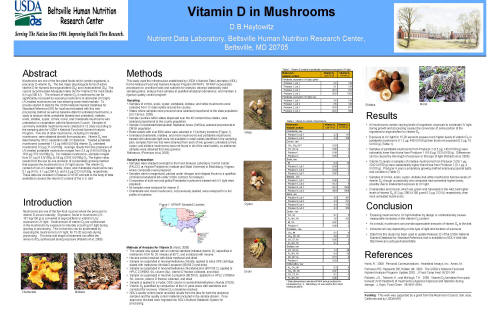|

by Kristina Fiore
Staff Writer
April 22, 2013
from
MedPageToday Website
|
Reviewed by F.
Perry Wilson, MD, MSCE; Instructor of Medicine, Perelman
School of Medicine at the University of Pennsylvania and
Dorothy Caputo, MA, BSN, RN, Nurse Planner |

Eating mushrooms may be as effective at
raising serum vitamin D levels as taking capsuled supplements,
researchers reported here.
In a small randomized trial, 12 weeks of daily intake of mushroom
extract raised
serum 25-hydroxyvitamin D [25(OH)D] levels comparably
to daily intake of vitamin D2 or D3 supplements, Michael Holick,
MD, PhD, of Boston University, and colleagues reported at the joint
American Society for Biochemistry and Molecular Biology and the
Experimental Biology meeting in Boston.
"These results provide evidence that
ingesting mushrooms that have been exposed to ultraviolet light
and contain vitamin D2 are a good source of vitamin D that can
improve the vitamin D status of healthy adults," Holick said in
a statement.
Mushrooms produce vitamin D2, or
ergocalciferol, when exposed to sunlight or ultraviolet radiation,
in a similar process by which humans produce vitamin D3, or
cholecalciferol.
Not all plants possess this property,
but fungi, seaweed, and yeast do.
Clinicians largely recommend vitamin D3 supplements, particularly
for those who are vitamin D deficient or insufficient, but studies
have shown vitamin D2 to be effective at increasing serum levels of
the vitamin as well.
Kurt Kennel, MD, of the Mayo Clinic in Rochester, Minn., who
was not involved in the study, noted that,
"vitamin D2 has gotten a bit of a
bad rap in the scientific literature in the last couple of
years," but added that both forms of the vitamin have been shown
to be beneficial for calcium and bone metabolism.
"We don't want to look at one or the other as ineffective," he
told MedPage Today, "but there probably is a difference. We
wouldn't want to say that this is an equivalent way of treating
vitamin D deficiency."
However, he added, mushrooms are likely,
"a very reasonable approach for people who want to get vitamin D
from foods that are not animal-based."
To determine whether eating mushrooms - in this study (Evaluation
of the bioavailability of vitamin D2 in mushrooms in healthy adults),
extract of dried white button mushrooms (Agaricus bisporus) - was as
effective at increasing and maintaining vitamin D status as
supplemental vitamins D2 or D3, Holick and colleagues randomized 30
adults, mean age 35.2, to one of three interventions taken once a
day for 12 weeks during the winter:
-
Capsules containing 2,000 IU of
vitamin D3
-
Capsules containing 2,000 IU of
vitamin D2
-
2,000 IU of mushroom powder
containing vitamin D2
Patients had similar baseline levels of
serum vitamin D:
A total of 25 patients completed all 12
weeks of the study, and serum vitamin D levels gradually increased
until they plateaued at about 7 weeks for all three groups and were
maintained for the next 5 weeks, the researchers said.
At the end of the study, vitamin D levels among those eating
mushrooms were comparable to those taking vitamin D supplements:
-
D3 group: 34.4 ng/mL
-
D2 group: 29.2 ng/mL
-
Mushrooms: 31.1 ng/mL
Holick said the findings suggest that
taking mushrooms and the vitamin D2 they provide can improve serum
vitamin D levels.
The results confirm other studies that have shown eating vitamin D2
- either in the form of fortified orange juice, a supplement, or a
pharmaceutical formulation - can increase total circulating serum
25(OH)D concentrations for at least 3 months and up to 6 years,
Holick said.
He added that exposing mushrooms to UVB light can produce vitamins
D3 and D4 as well, giving patients additional vitamin D.
The study (Evaluation
of the bioavailability of vitamin D2 in mushrooms in healthy adults)
was supported by the Mushroom Council, a trade organization of which
Monterey Mushrooms - the company that produced the mushroom powder
used in the study - is a member.
Mushrooms Can Be an Effective Source of
Vitamin D - Study
24 April, 2013
from
TimesLive Website

Tucking into
a bowl of cream of mushroom soup
or a plate of
sauteed mushrooms
may be an effective way of
upping your vitamin D intake,
provided you
choose mushrooms that have been exposed
to
plenty of UV light, suggest the authors of a
new
US study.
In the randomized study out of Boston
University, 30 healthy adults took capsules of vitamin D2, capsules
of vitamin D3, or mushroom powder containing vitamin D2 once a day
during the winter, when stores of the sunshine vitamin are low.
Doses all measured 2 000 International Units (IUs).
Vitamin D is crucial for building
strong bones and muscle strength, and helps reduce the risk of
fracture and osteoporosis. It’s been shown to help fight infections
like the flu and to play a role in,
After 12 weeks, researchers found no difference in the vitamin D
levels among participants who took supplements versus those who
ingested the mushroom powder.
"These results provide evidence that
ingesting mushrooms which have been exposed to ultraviolet light
and contain vitamin D2, are a good source of vitamin D that can
improve the vitamin D status of healthy adults,” said lead
author Michael Holick in a statement.
The findings were published in the
journal Dermato-Endocrinology and presented Monday at the
American Society for Biochemistry and Microbiology annual
meeting in Boston.
It’s been a good week for the fungi, as another study released this
week out of John Hopkins Bloomberg School of Public Health concluded
that swapping out meat for mushrooms in one meal a day helped
subjects lose weight, reduce overall body fat and maintain their
weight loss over time.

Origin
|




